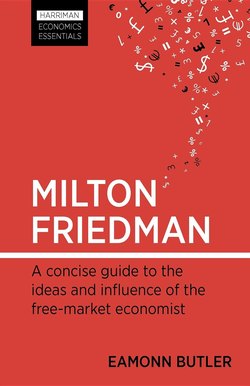Читать книгу Milton Friedman - Eamonn Butler - Страница 21
На сайте Литреса книга снята с продажи.
The Public Intellectual
ОглавлениеHowever, the postwar years were dominated by a general belief in the necessity and effectiveness of government controls. Those who, like Friedman, valued individual freedom and supported free-market capitalism were a beleaguered minority. In 1947 the economist and political scientist Friedrich Hayek brought a handful of them together in the Swiss resort of Mont Pelerin. He hoped they could form an intellectual kernel to keep the values of liberalism – in the classical, European sense – alive during what seemed particularly dark times.
Two of the participants at Hayek’s meeting were Milton Friedman and his friend George Stigler. Though the ideas of the Mont Pelerin Society, as it became known, remained in the intellectual wilderness for decades, it continued to grow, becoming a leading focus for liberal ideas. It would produce many Nobel economists – including Friedman, Hayek and Stigler – and Friedman would become one of its most distinguished presidents.
Some 15 years after that first meeting in Mont Pelerin, Friedman produced a book that changed him from a little-known professional economist (albeit one who focused on the big public issues like inflation) into a famously controversial public intellectual.
His 1962 book Capitalism and Freedom, written with his wife Rose, pulled no punches. It began with a thoroughgoing endorsement of the principles of personal liberty on which their country was founded. It went on to show how government intervention had eroded this liberty, leaving human society less free and the economy less efficient, capable and prosperous. It closely reflected the views of the 19th-century English philosopher John Stuart Mill: a belief in the dignity of the individual, a conviction that progress occurs only through the genius of individuals, and the conclusion that we must uphold the diversity and variety that allows individualism to flourish. It also drew from the arguments in Hayek’s seminal book The Road to Serfdom, that the greatest threat to freedom and progress is concentrated power.
From this liberal foundation, Capitalism and Freedom went on to address the great public issues of the day – economic policy, trade, education, discrimination, monopoly and poverty. Its policy prescriptions seemed unachievably radical at the time; but 40 years on, almost all of them have begun to be implemented or trialled in some part of the world or another. It called for flat taxes, with everyone paying the same rate – a system pioneered by Estonia and now adopted by a score of other countries. It demanded that state-run Ponzi-scheme pension systems should be replaced by saving through personal accounts – a transformation made by Chile and a growing number of other nations. It recommended replacing the state mail service by competition, which is happening today across the European Union. It called for an end to military conscription, a bitter argument in the United States at the time, which Friedman eventually won. It recommended that drugs should be decriminalised – a policy that is now being tested in several places.
“Every friend of freedom. . .must be as revolted as I am by the prospect of turning the United States into an armed camp, by the vision of jails filled with casual drug users and of an army of enforcers empowered to invade the liberty of citizens on slight evidence.”
– Milton Friedman in The Wall Street Journal, 7 September 1989
The book was a huge success, selling hundreds of thousands of copies. Milton and Rose called their summer cottage in Vermont Capitaf after it. And it confirmed Friedman’s status as a national controversialist. His quick wit, engaging personality and easy-to-grasp arguments made him a natural participant in any public debate – particularly when some lone voice against mainstream thinking was needed. He wrote magazine articles, appeared on radio discussions, and was always happy to criticise the Federal Reserve at Congressional hearings in Washington.
